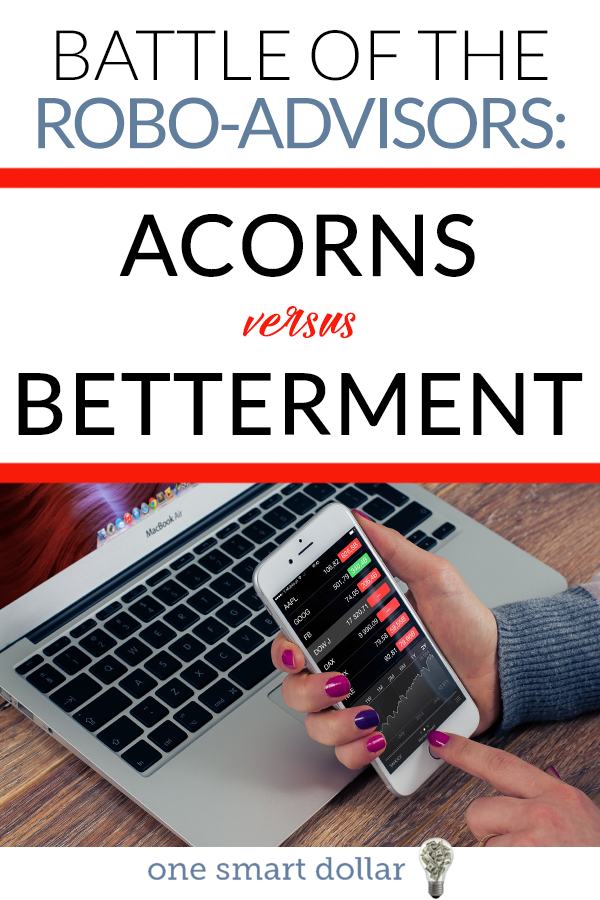
Acorns vs Betterment
Robo-advisors are rapidly gaining popularity. Their no-nonsense form of investing, combined with appealing low advisor fees, is bringing in dollars rapidly. But often people are wondering which robo-advisor platform is the best? Which one will suit my needs? While everyone has different needs, we can take a look at the biggest, and the fastest growing. We’re comparing Acorns vs Betterment.
These are not the only two robo-advisors out there, and neither one may be perfect for you (depending on your investment needs). But based on size, Betterment has the most assets under management. But based on unique savings and rapid growth, Acorns is a rising star that can’t be overlooked. Here is how the two compare.
Which is Easier to Use?
Both Acorns and Betterment have easy to see, easy to use apps. Both are very user friendly, and both are designed to help you make the most of your investing experience.
Acorns is designed to round up small purchases and deposit the change into an investment account. Inside the Acorns app you can easily see the deposits, round-ups, and other gains that have been made. A graph shows you how your account value has changed over time, and a quick look gives you the details on your risk tolerance profile.
Betterment isn’t quite as nice to look at as Acorns, but it is just as functional. It’s designed for those that want to check their balance, make a deposit (or withdraw), and get on with life. A quick overview shows your amount invested, amount earned, and the percentage you have gained. You can also review your risk tolerance profile.
Investment Transparency
One of the put-offs that the modern investor has is the lack of transparency when dealing with a financial company. For those that aren’t working in the industry it can be very confusing. Lack of transparency is a deal breaker for many.
Acorns uses the Modern Portfolio Theory of investment. This theory essentially uses mathematical principles to determine the most precise diversification to minimize risk and maximize return. But that’s about all you will find on the investment strategy. The rest is just a percentage breakdown of which asset classes you’re invested into. There are just 6 ETF funds used.
Betterment also uses the Modern Portfolio Theory. But they go further and include interactive graphs and charts that show how your portfolio would change with different allocations. You can quickly see where the money is invested (US stocks, global stocks, etc.) and how it is invested (bonds, commodities, real estate, etc.). In other words, Betterment is as transparent as you can possibly be when investing you into 13 different ETF funds.
Investment Features
The way your money is invested is largely the same with Acorns vs Betterment. However, the key features on how to get you to invest more (and keep more of your investment) are very different.
Acorns is named after the acorns that squirrels hide for the winter. One acorn won’t do much; many acorns will. This was the premise behind designing the round-up feature that allows you to invest many little “acorns” for your future.
Betterment is designed for those who have created the discipline to save and invest regularly, but need a little extra help to keep their money (instead of paying excess taxes). Incorporating Tax Loss Harvesting this robo-advisor sells some stocks low in order to offset gains in others. Their claim is that they can offset your taxes by 1%; a significant amount in the long run.
The Bottom Line Comparing Acorns vs Betterment
If you’re saving and investing anything, you’re doing far better than most of your peers. But most of us would like to take it even further and invest even more.
For those who don’t want to set aside large chunks of money every month, but would rather have everything happen behind the scenes with as little worry as possible, Acorns provides an easy to use platform for them.
For those who have the discipline to make regular contributions, but need a little boost on the management side (that is, to save money by Tax Loss Harvesting), then Betterment is a great option for them.
Neither robo-advisor requires a minimum deposit. Both Acorns and Betterment have low annual fees (.25% for a basic account up to .4% for a premium account). Both will automatically rebalance your portfolio when you have strayed too far from your target; both allow non-qualified and qualified accounts; and both have apps designed for both Android and iOS.
When comparing Acorns vs Betterment, the bottom line is simply deciding which main feature you prefer.
Sign Up For Betterment – Get Up To 6 Months Free!
Sign Up For Acorns

